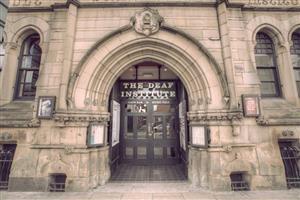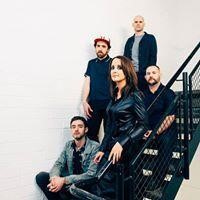* Page Loading - Please Wait *
View other acts in Antrim
This Act is currently unclaimed. If you are responsible for the act please claim control by Clicking Here
Most bands will have plateaued after fifteen years in the game, but Beoga aren’t most bands. Describing themselves as “Four Nordy lads and a Limerick lass beating out the new wave trad,” 2017 saw Beoga tick off an enviable list of accomplishments from their shared bucket list. But that just the start of the story, as their recent experiences have inspired a bold new chapter in the quintet’s tale.
The turning point came when Beoga collaborated on two songs on Ed Sheeran’s global hit album ‘÷’. After it shot to the top of the charts all over the globe, those two tracks – ‘Galway Girl’ and ‘Nancy Mulligan’ – accumulated over 687 million streams at Spotify. Suddenly those landmarks events came thick and first. A first chart-topping hit in Ireland? Done! A guest slot during Sheeran’s Glastonbury headline set? Completed! A debut appearance on Top of the Pops? In the bag.
“It’s rare that a door opens for an opportunity like this, and it’s a real privilege,” says Beoga’s bodhrán player and unofficial spokesman Eamon Murray.
Throughout their five albums to date, Beoga have always pushed the boundaries of the Irish trad sound by embracing everything from bluesy riffs to a raunchy New Orleans jamboree vibe. “The five of us are pretty tight. Our musicianship and our credentials are intact, so this feels like a natural progression,” Murray continues. “We’ve always been conscious of not doing the same thing twice.”
Murray’s early influences are surely indicative of the band’s open-ended approach to genre. Rather than being inspired by other bodhrán players, Murray was instead fascinated by innovators such as Steve Gadd and Parliament-Funkadelic’s Dennis Chambers.
He met future bandmate Séan Óg Graham through childhood classes at the Irish traditional music institute Comhaltas. Graham played the accordion, later with tuition from Damian McKee, and also took up the guitar in his mid-teens. Soon enough, Murray, Graham and McKee connected with pianist Liam Bradley, who had been inspired to play tin whistle and then the piano through a background in Irish dancing.
The quartet toured Ireland, performing at dancing competitions and fleadhs. “I was usually only there for the drink,” laughs Bradley, “but when the four of us got together at one of these fleadhs in 2002, that’s when we decided to start the band.”
While it was a good opportunity to travel and have a good craic, Murray noted that something special was emerging from their initially limited ambition. “The music was different from day one. The instrumentation really wasn’t typical at all. Other Irish bands would have a fiddle and a guitar. They certainly wouldn’t have had two accordions and a piano. We just kept at it in that vein, and it got legs.”
One of Beoga’s early fans was Niamh Dunne, who hailed from a long heritage of traditional musicians. “Their first album [2004’s ‘Lovely Madness’] was its own thing,” she remembers. “They weren’t trying to be like other bands that were around. They were breaking new territory and it was exciting. I remember going to see a gig and just loving it.”
After meeting Graham at university, Dunne was gradually enveloped into Beoga’s world over a six-month period. “It was important that I was going to sing and play fiddle. I was fully integrated into the band and become part of the process of doing something different.”
In the years that followed, Beoga toured the world, released several albums and experienced things they’d never dreamed of doing, such as performing at BBC’s Proms in the Park. The Wall Street Journal even heralded them as, “The most exciting new traditional band to emerge from Ireland this century.”
Their willingness to bend genres had meant that they always hoped to be a band who could take Irish culture to an international audience, much as the likes of The Chieftains, Enya and The Coors had done before them.
The reality, reflects Graham, was a little different. “We fell between two stools a bit. What we were doing wasn’t Irish enough for the biggest Irish-American festivals – they want something that’s very in that box and what we were doing was a bit more leftfield. That whole world is really big, but we weren’t 100% the right fit for it.”
And then after fifteen years of endeavour everything changed overnight. Ed Sheeran got in touch via their mutual friend Foy Vance to suggest working together. After receiving some ideas, Beoga headed to the studio to collaborate with arguably the world’s biggest pop star.
“It was a lot less intense than other recordings we’d done,” says Bradley. “It was very unfussy – we’d play something maybe three times and it would be finished. Whereas on other recording sessions, we’d analyse how to improve every note.”
“It was an insight into how the pop world works,” adds Murray. “You use big brushstrokes and then hone in on the detail, whereas Irish musicians are really guilty of picking apart their own performances note-by-note. It’s stuff that would never be heard, or at least noticed, on a pop record. We were pleasantly surprised that with all our years of playing together, we were fit to do everything twice and everyone was delighted with it.”
They headed home after working on half-a-dozen ideas. Sheeran seemed to be happy with the results, but whether anything would make the final cut would be another matter. “We hoped we’d be on, but it wasn’t until we got home we thought that maybe we wouldn’t,” recalls Bradley.
They made the decision to keep quiet about it until they knew for sure. “Otherwise,” laughs Dunne, “you’d tell the world about it and then look like a right eejit. But luckily we made the cut and we were delighted.”
After those big moments arrived on a regular basis and their audience became noticeably younger, thoughts turned to Beoga’s future. They headed to Aberfeldy in Scotland to commence five days of writing with Vance and Snow Patrol’s Johnny McDaid, with the aim of finding the precise intersection between trad music and contemporary pop.
“We were making music like we’d never done before,” says McKee. “It was like starting again from scratch.”
“You have to find a really good hook,” adds Graham. “It’s challenging to find something that’s vibey enough to last through an entire song.”
Murray expands upon the process: “Previously we’d be making constantly changing instrumental music, but now we wanted to find ten seconds to build verses and choruses around. It’s totally different. Looking for the perfect pop song is a process that we were previously familiar with, but it’s one that we’re getting better at.”
“It’s been a huge learning curve for me,” enthuses Dunne, noting that such experimentation was what first sparked her interest in the band.
The first taster of Beoga’s forthcoming material comes with ‘We Don’t Have To Run’, a collaboration with Ryan McMullan. It proves that they’ve got the formula just right. The Irish essence of their sound remains completely authentic, but the soaring chorus provides the kind of hook that could take their music to new audiences – which is something they’ll be doing this summer when they support Sheeran on his Irish tour.
Murray hopes that the combination of the fresh Beoga sound together with Sheeran’s patronage presents a new era for Irish music on the global scale.
“I think and hope that it gives Irish kids some kudos because Ed thinks this music is cool,” he concludes. “Pop stars and celebrities influence what we’re listening to globally. Irish music has enjoyed a bit of a resurgence at various times, but it’s been a while since it last happened. But it certainly feels like it’s coming now, and hopefully everyone will get a lift from it. All boats in a rising tide, you know?”



Tue 21st Oct 25 19:00
Glasgow, Lanarkshire
Venue Type : Bar

Tue 21st Oct 25 19:00
Glasgow, Lanarkshire
Venue Type : Bar

Wed 22nd Oct 25 19:00
Manchester, Greater Manchester
Venue Type : Kitchen, Bar and Music Hall
Kitchen, Bar and Music Hall in central Manchester.

Fri 24th Oct 25 19:00
London, Greater London
Venue Type : Live Music Venue

Fri 21st Nov 25 19:00
Belfast, Antrim
Venue Type : Concert Hall






